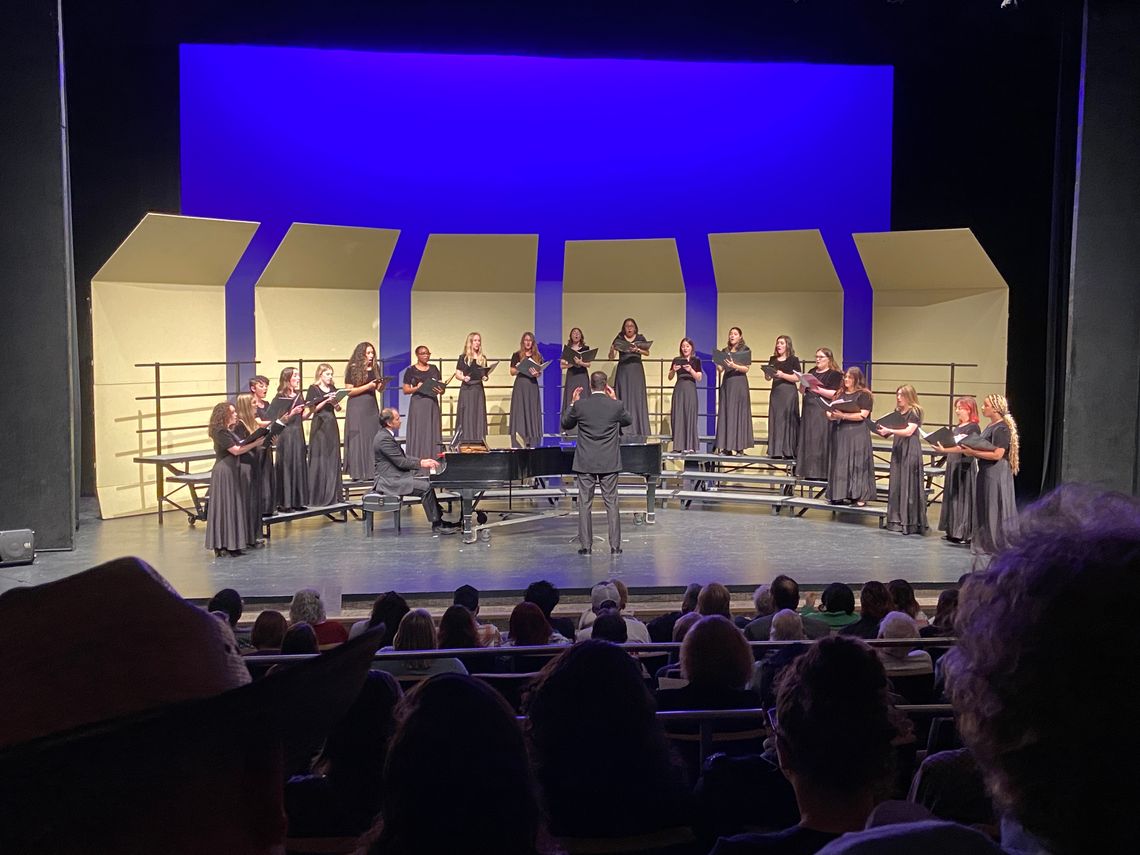BY ASHTYN HANSARD / Executive Producer
Tarleton State University’s fine art programs offer many opportunities for students to showcase their talents and efforts, including performances for the public. On April 19, Tarleton’s men and women’s choir groups got together to put on their performances to the community and Tarleton students in the theater at the Fine Arts building.
The concert started out with a song called “Tuba” performed by the men’s choir. Two students, James Gonzales and Blake Rosenberg, were seated in the middle of the stage with drums in front of them. They began playing a repetitive beat while the choir marched in from the sides, marking the start of the performance. The song was very upbeat, featuring solos from Cooper Richardson, Travis Paul, Jade Rudolph and Ian Martin.
The next song, called “Indodana,” featured a mix of members from the men and women’s choir. The song was much slower than the opener, letting a softer mood settle over the room. The combined voices of the men and women added more depth to the song, making it my personal favorite performance of the concert.
“Sicut Erat” was the first song that was performed solely by the women’s choir and was quickly followed by the piece called “Lowlands,” which was performed by the men’s choir. It featured solos from Gavin Riggs and James Smith.
“Invictus” was the fifth song of the night and performed by the men’s choir. This song was very interesting as it was noted before the song began that this piece had inspired Nelson Mandela to keep continuing his creations at that time because he was so deeply moved by the lyrics of the piece.
“Sèrènade Italienne” was a French piece and was performed by the women’s choir. It was quickly followed by “Ouvre ton Coeur,” which was also performed by the women’s choir.
“Storm Comin’” was up next on the program and was also performed by the women’s choir. However, this song differed from the others due to the members of the choir using acapella to enhance the performance. The members would use clapping, stomping and snapping to mimic a storm passing through as they sang.
“Crabbuckit” was another acapella piece performed by the women’s choir, although it had a much different feel. While “Storm Comin’” was slower and had deeper lyrics, “Crabbuckit” had a jazz style in not only the harmonies, but also the style of acapella they performed. Jackson Griffith joined the choir on stage to play the bass, only adding to the experience.
The men’s choir came back up at this time to perform a few songs, starting with “When the Earth Stands Still.” This piece was led by a student conductor James Gonzales-Jackowiak and was soon followed up by two untitled pieces performed by four members of the men’s choir, Jade Rudolph, Nolan Moore, Cooper Richardson and Peyton Stevens.
“Sitting in Limbo” was a combined choir piece with solos by Cooper Richardson, Jade Rudolph, and Emma Cottle. The soloists captured the true energy of the song, blending perfectly together and bringing a great energy to the room.
The women’s choir came back on stage to perform “No Time,” a song about the journey with angels after passing away. The men then came to join the women in performing “My Soul’s Been Anchored in the Lord.” The song had a strong opening with many different call and response lyrics, adding a new style to the song.
The next song was titled “I’ll Be on My Way” and featured James Smith and Ian Martin as soloists. The song’s lyrics told a message from the perspective of someone passing into the afterlife. They ask the listener multiple times in the lyrics to not be sad as they pass on, which I consider ironic since this piece made me shed a few tears.
The last piece was performed by the men and women’s choir and was titled “Faith Over a Few Things.” It had well blended harmonies and a strong finish that really pulled the whole performance together.
The combined choirs ended the performance with the Tarleton Color Song before the room erupted with applause. The Tarleton choirs truly showed how much effort they put into their work and outdid themselves.
.png)

Comment
Comments